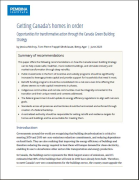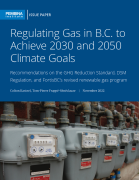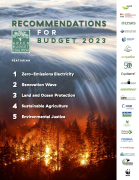Tom-Pierre Frappé-Sénéclauze's Research & Analysis

Buildings
June 19, 2023
Publication
Getting Canada’s homes in order
Opportunities for transformative action through the Canada Green Building Strategy



Buildings
June 7, 2023
Publication
Effective demand-side energy measures
Aligning utility incentives with B.C.’s climate and energy goals



Oil & Gas
February 23, 2023
Article
B.C. gas utilities need to rethink their business models
For B.C. to meet its net-zero commitments, the province’s natural gas system will need to look very different than today

Buildings
January 18, 2023
Op-ed
Canada needs a better approach to net-zero home renovations
Incentive programs need to meet homeowners where they are and set them on a path to zero-carbon homes



